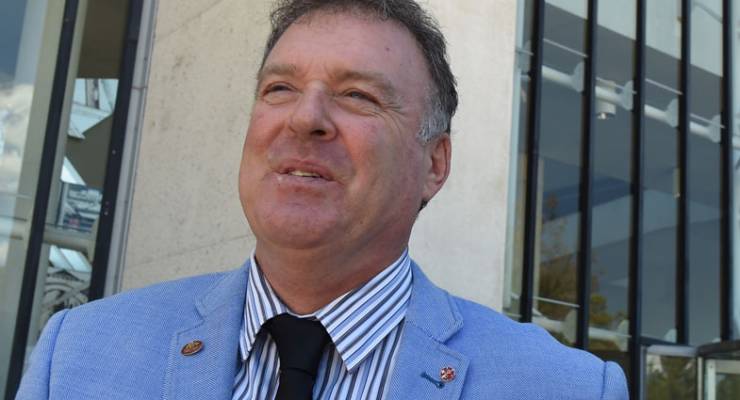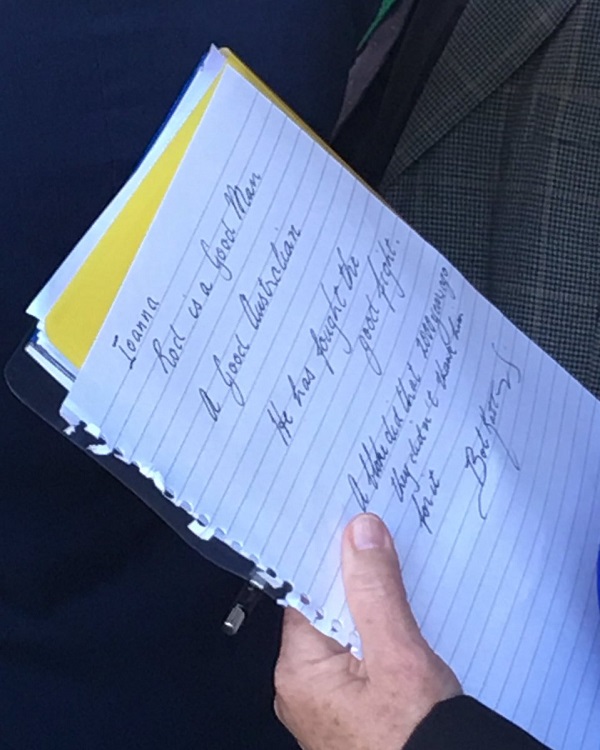
In something of a theme of One Nation Senator Rodney Culleton’s time in Parliament so far, his day in the High Court was more noteworthy for what happened outside the building than in it.
Culleton — in the middle of a very public and increasingly bitter dispute with the leader of his party Pauline Hanson — fronted up to the High Court on Wednesday for the hearing into whether he was eligible to be elected to the Senate given he had been convicted in absentia for stealing the key to a truck at the time of the election. The thrust of his case is whether the subsequent annulment of that conviction means it is considered that he never had a conviction and thus can remain the One Nation senator for Western Australia.
As he turned up to court dressed in what is becoming his trademark blue jacket and cream-coloured pants, he told the waiting press pack his case showed the “courts are out of order” and suggested he might make state-based courts come before the Senate. Disappointingly for the media, but perhaps better for democracy, Culleton found what he said was a barrister who “loves One Nation” to represent him. That One Nation-loving barrister turned out to be Peter King, the barrister who previously represented Bob Day in the Senate voting-reform case and the former MP for Wentworth who was ousted by the prime minister in a bitter preselection more than over a decade ago.
The costs were racking up for Culleton, however. He said it would “exhaust anyone’s credit card”. He wouldn’t tell the waiting media what his arguments were because he was just about “sit down at the table and play poker”. On his ongoing dispute with Hanson, Culleton said he wasn’t going to be a “muppet or puppet” in Parliament, and denied that the media attention had gone to his head.
“Sometimes the media is like an old sheep dog. It gets in your way.”
After Culleton’s three attempts at having the case adjourned were defeated, an elderly man rose up and shouted at the justices that it was a “kangaroo court”.
“This is a kangaroo court. There is no jury here. This is a star chamber.”
Journalists in the spillover room raced down to the front of the High Court to find the man, John Wilson, a dentist by trade, who himself is a vexatious litigant who once was jailed for contempt of court for throwing paint bombs at a judge. Wilson is of the belief that every case deserves to be a trial by jury because the Magna Carta says so. He is a recent One Nation member who calls himself a friend of Culleton — Culleton was a bit more circumspect when it came to his ties to Wilson.
The Commonwealth’s case was succinct. Although the conviction was annulled, it existed at the time of the election, and the annulment is proof it existed. If a marriage is annulled but there are children, they are still a product of that marriage. If Culleton is to be found to have been ineligible, the Commonwealth would like to see a recount, which would likely elect Culleton’s brother-in-law in his place as a One Nation senator.
Culleton’s defence went for longer, extending over the lunch break. The argument was that Culleton had not been sentenced, his conviction being annulled meant it had never existed, and he was never subject to a sentence of 12 months or more, which would disqualify him. At one point King argued that even if he had been, the sorts of crimes that could land you a jail term of that length were “anomalies”.
“If we take the example of an MP who as a matter of courtesy takes his secretary to the bar of the House for a tonic and the waiter mishears and brings a gin and tonic, that is a crime punishable by two years. If it so happens that the MP is going away on an overseas trip and he asks his staff member to appear in the court and the staff member fails to turn up, bang, that is the end of his career. Another example is the MP who forgets his key or takes away his key and leaves it in his pocket.”
Justice Susan Kiefel replied: “Are these really helpful examples, Mr King?”
“Well, the key example is, your Honour, because this case is about a key,” King responded.
“That is about the only fact that it has in common, so perhaps we could keep to the legal arguments,” Kiefel shot back.
At the end of the hearing, Culleton made his way back to the waiting press pack and claimed, among other things, the constitution was locked up and inaccessible to everyone. He asked ABC reporter Matthew Doran when was the last time he had read the constitution — last week, was the reply, and in studying law.
Bob Katter — who had been in court to support his fellow “country boy” — wrote a note to Culleton’s wife, Ioanna (who is third on the WA One Nation ticket behind her brother and her husband), comparing Rod to Jesus. As the press conference wound up, Culleton’s chief of staff showed off the letter to journalists claiming that’s what real support looked like.

The letter reads:
Rod is a good man.
A Good Australian.
He has fought the good fight.
A bloke did that 2000 years ago and they didn’t thank him for it.
Bob Katter.
The High Court has reserved its decision. It will sit again on Friday, but experts tip that it could be early next year before a decision is made on Culleton’s fate.








Who knew that Jesus stirred up so much trouble over a key…? Live & learn.
‘Culleton said he wasn’t going to be a “muppet or puppet” in Parliament…’
Culleton should offer this valuable advice to Turnbull.
“….. I used her she used me, but neither one cared
We were getting our share.”
(Bob Seger – Night Moves)
Don Quixote or Sancho? War steed or donkey? As the Irish might say, grinning like an ass chewing on thistle.